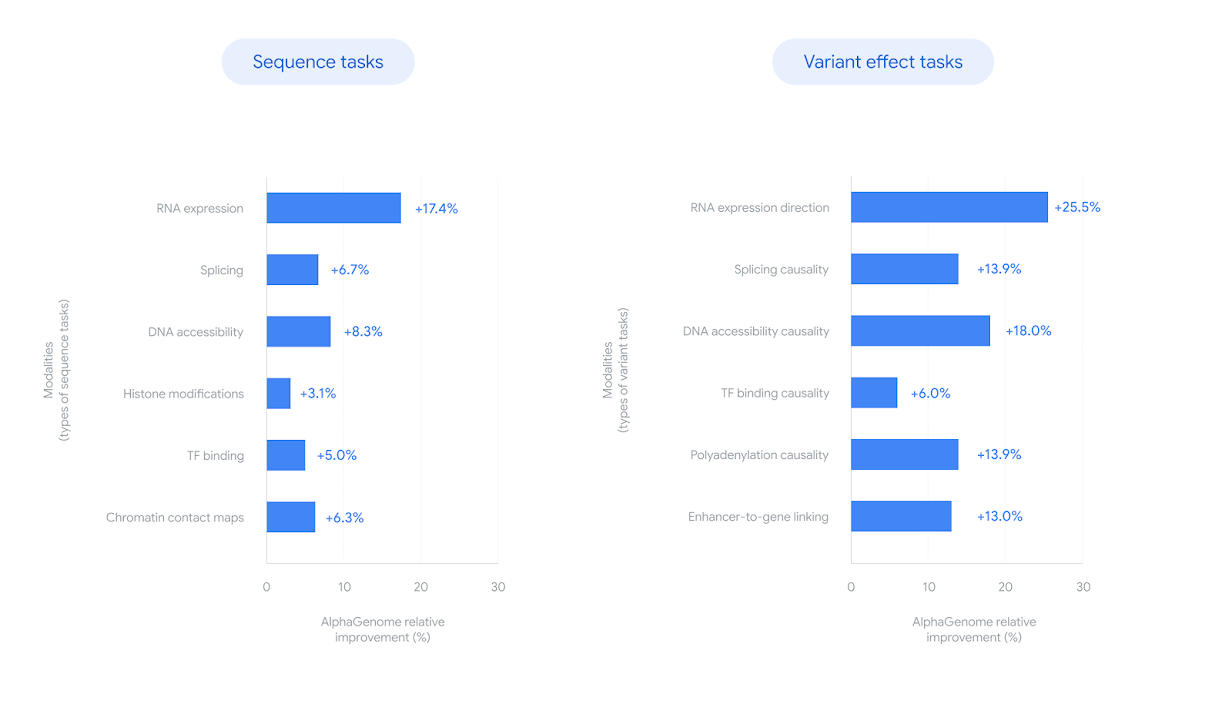- What can it do?
- # 1. Enter super-long DNA sequence
- 4. Overwrite clipping mutation predictions
- Technology: How does it happen?
- Practical application scene
- # 2. Synthetic biology
- # 3. Gene function mapping
- Why is it a breakthrough?
- Limits and future development
We know:
-
The human DNA is like a huge statement.
-
Some of these are “coded” proteins, but in fact 98% are “non-coded areas” which are responsible for controlling when and in what cells the genes are expressed.
-
The functions of these regions are difficult to predict, and small variations can have a significant impact on health (e.g. certain cancers or rare diseases).
AlphaGenome is a new AI model that aims to predict more accurately and comprehensively the effects of individual DNA variations on genetic regulation processes, with particular attention to the regulatory function of non-coded areas (98 per cent of the genome).
** It provides a more accurate picture of the functioning of these non-coded areas and their performance in different cells, as well as the possible consequences of variation**

-
Does a mutation cause an accidental activation of a cancer gene?
-
Which clipping point could be destroyed, leading to a genetic “wrong”?
-
Which sequence is suitable for “customization” for use in neurocells?
AlphaGenome has made a major breakthrough in DNA sequence length, predictive resolution, and multi-model modelling capabilities compared to previous models. It has built a unified framework that can be used to study regulatory mechanisms such as genetic expression, cutting, protein combinations, etc.
What can it do?
AlphaGenome can:
# 1. Enter super-long DNA sequence
- Analysable ** sequences of 1 million bases (DNA letters)** – more remote and comprehensive than previous models.
- Predict thousands of regulatory properties These include:
-
Which locations may be genetic starting or endpoints;
-
Which areas would be involved in RNA clippings (significant biological processes);
-
Which DNA areas are attractive to certain proteins;
-
The extent to which RNA expressions are active in different cell types.
- Rapid assessment of the effects of variability
-
Comparison of sequence predictions before and after mutation;
-
The ability to determine that this variation may not cause disease, affect genetic expression or disrupt the regulatory function.
4. Overwrite clipping mutation predictions
- It’s an important breakthrough, especially in understanding ** rare genetic diseases**, like spinal muscle atrophy, etc.
Technology: How does it happen?
** Technological architecture**
-
roll layer: detection of short-sequence patterns (e.g. motif of DNA)
-
Transformer: Create global information flows in super-long sequences
-
** Efficient training**: Using TPU clusters, it takes only 4 hours to calculate half of the resources from the previous Enformer
AlphaGenome uses advanced technology in several AI fields:

-
Of the 24 DNA sequence prediction missions,** AlphaGenome exceeded the current optimal model by 22**;
-
Of the 26 variant prediction missions, ** matches or exceeds 24 of the best available models**;
-
A model for the first single model for all predictive models;
-
Support for API call to provide scientists with the capability to predict trans-modular integration.
Practical application scene
AlphaGenome is not just a theoretical tool, it has a strong application value:
- Research on disease mechanisms
-
May be used to reveal which mutations affect genetic expression and may lead to cancer or rare genetic diseases.
-
Official display: predicts that specific mutations in T-ALL leukemia will activate the TAL1 cancer gene and simulate the known mechanisms.
# 2. Synthetic biology
- Help design DNA components with specific functions (e.g. starters only in neurocells).
# 3. Gene function mapping
- Assisting scientists in systematically mapping genetic control mechanisms in different cells.
Why is it a breakthrough?
It addresses several key constraints:

Limits and future development
Despite the remarkable progress made, AlphaGenome is not “one-size-fits-all”:
-
Still difficult for super-distance regulation (> 100kb);
-
Certain ** tissue-specific forecasting capabilities** are still improving;
-
does not apply to individual clinical genetic predictions**;
-
Complex forms (e.g. environmental or multigenic interactions) still need to be analysed in conjunction with other tools.
In the future, Deepmind plans to expand training data, support more species and functional models and gradually open up complete models. Currently, AlphaGenome is available for non-commercial use to scientists worldwide through API. Researchers can:
-
Testing of variations in different biological projects;
-
Rapid presentation and validation of mechanism assumptions;
-
Build their own downstream models or tasks;
Official presentation: https://deepmind.google/discover/blog/alphagenome-ai-for-better-understanding-the-gender/
-
** Read our preprint**
-
Use the AlphaGenome API
-
Join the community forum

